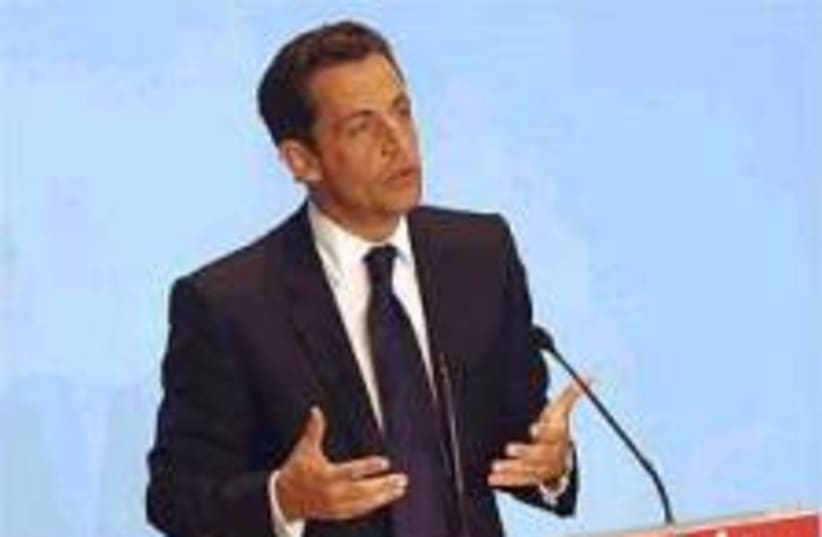Sarkozy loses patience with Assad
French president says he's reached "end of the road" with Syrian leader over Lebanese presidential crisis.
"I have reached the end of the road with [Syrian President Bashar] Assad. Words alone won't suffice, I want actions," French President Nicolas Sarkozy was quoted as telling reporters Wednesday at the Champs-Élysées in Paris.
France has grown increasingly impatient with Syria, particularity over its intervention in Lebanese politics and its alleged involvement in political assassinations in the country.
Sarkozy spoke with Assad on several occasions recently in order to bring about a solution to the crisis over the Lebanese presidency, but it appears that his patience is now wearing thin. "I spoke to him three times recently and I spoke with him clearly and honestly," said Sarkozy. "I took the risk and spoke with him when no one else would," Asharq Alawsat quoted the French president as saying.
Sarkozy continued: "I took the initiative and said to him: 'Lebanon has a right to have an autonomous president who will have a national unity government. You must use all the means and abilities at your disposal to influence the attainment of this goal!'"
"But I am telling you," he was quoted by the London-based newspaper as saying. "I have reached the end of the road with Assad. Now words will not suffice, I want actions." Sarkozy added that Assad's last chance would be on Saturday, the latest deadline set for the Lebanese parliament to elect the next president. He said the last time he spoke with Assad was on Sunday.
The Lebanese presidential post was left vacant after pro-Syrian President Emile Lahoud stepped down on Nov. 23.
The ruling coalition has accused the opposition of obstructing the presidential vote under orders from Syria and Iran. In turn, the opposition claims pro-government groups in the parliament majority follow US policies.
The deadlock came after lawmakers on both sides agreed last month to back Army Commander Gen. Michel Suleiman as a consensus candidate for president.
But to elect him, the parliament must convene and first approve a constitutional amendment that allows a sitting military chief to become president, and then vote on Suleiman.
The opposition has demanded the ruling coalition agree on the shape of the future government ahead of the parliament vote, including the division of the posts in the next Cabinet. The ruling coalition says the opposition is setting conditions which are rejected by pro-government groups.
The French president also pointed an accusing finger at Hizbullah. "The obstacles are tied with Hizbullah that wants the country's opposition to have the ability to thwart any decision that it doesn't agree with."
The reporters also pressed Sarkozy on the Iranian threat and its influence in Lebanon.
"We have a different problem with the Iranians - nuclear weapons," the French president responded. "I constantly say, nuclear weapons in the hands of Iran is unacceptable. I will not change my mind and we have open negotiation channels with Iran in order to convince them of this fact. We demand that they let international monitors carry out their work."
Regarding the Israeli-Palestinian issue, the French president said that just like Israel was "a political fact" established in the first half of the 20th century, a Palestinian state will be a "new fact" of the 21st century, adding that "the Palestinians and Israelis will remain neighbors just like we and Germany are neighbors."
Sarkozy said that he was a friend of Israel but also a "friend of the Arabs." He reiterated his stance that settlement activity should be stopped, 1967 borders restored and that a Palestinian state should be established in the West Bank, Gaza Strip and east Jerusalem.
if(catID != 151){
var cont = `Take Israel home with the new
Jerusalem Post Store
Shop now >>
`;
document.getElementById("linkPremium").innerHTML = cont;
var divWithLink = document.getElementById("premium-link");
if(divWithLink !== null && divWithLink !== 'undefined')
{
divWithLink.style.border = "solid 1px #cb0f3e";
divWithLink.style.textAlign = "center";
divWithLink.style.marginBottom = "40px";
divWithLink.style.marginTop = "40px";
divWithLink.style.width = "728px";
divWithLink.style.backgroundColor = "#3c4860";
divWithLink.style.color = "#ffffff";
}
}
(function (v, i){
});

